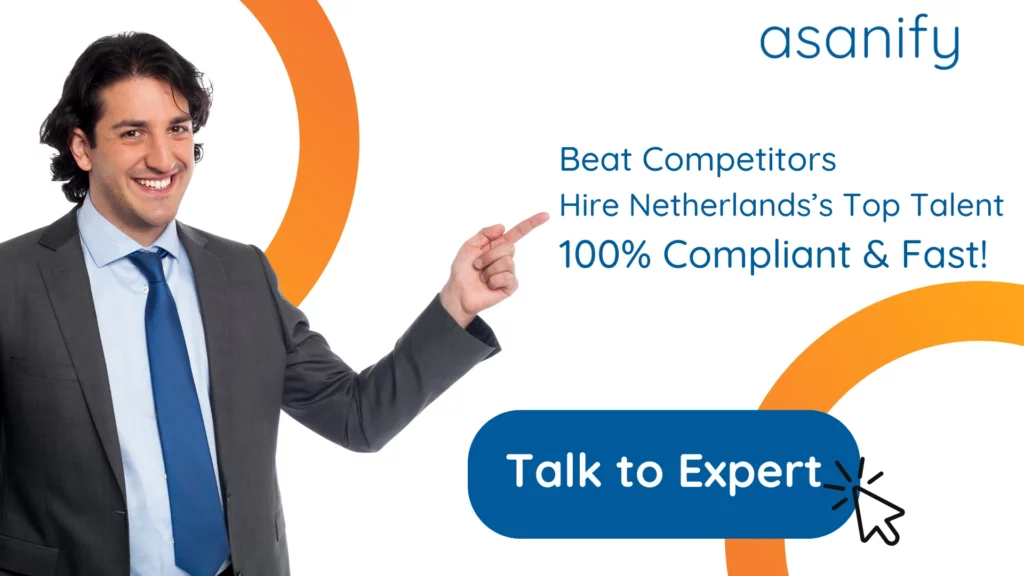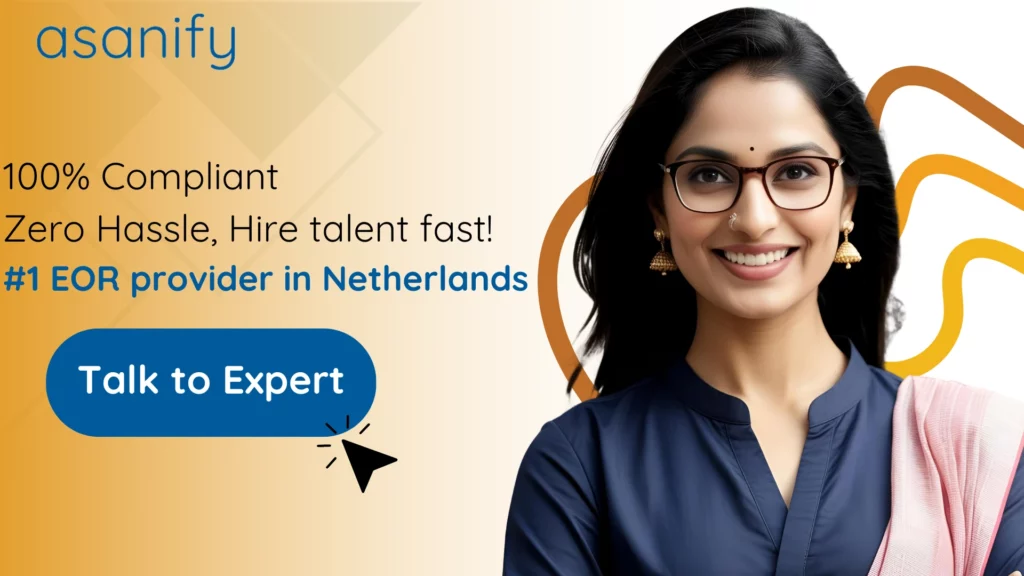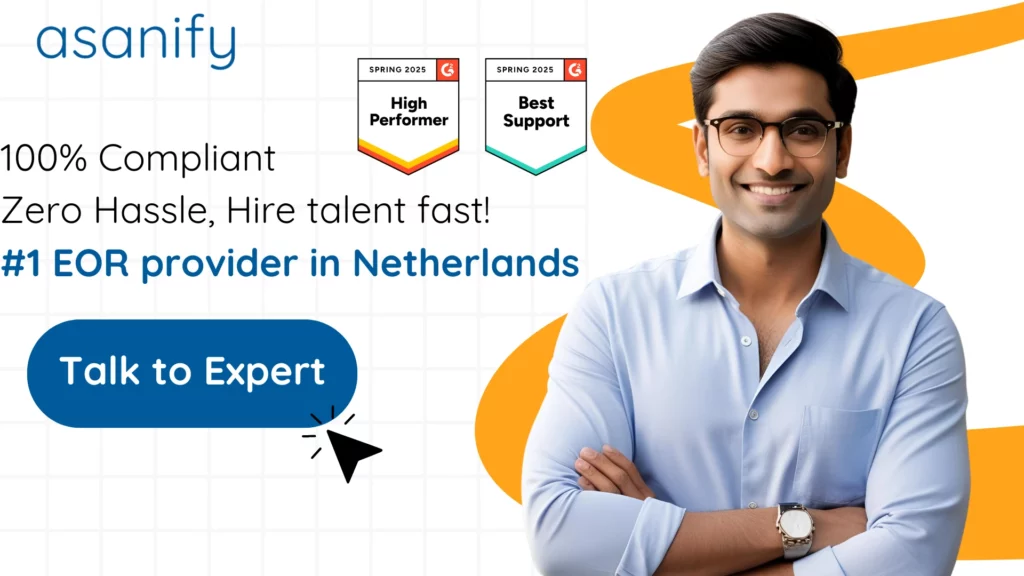Expanding your business into the Netherlands offers access to one of Europe’s most dynamic economies and a leading hub for trade, technology, and innovation. However, before hiring in the Netherlands, employers must understand the country’s work authorization process. Securing the correct work permit and visa in the Netherlands for non-Dutch employees is essential to staying compliant with immigration regulations and ensuring a smooth onboarding experience.
Navigating these requirements can be challenging, as they vary depending on the employee’s nationality, occupation, and intended length of stay. Employers must ensure that all required documentation is complete, accurate, and submitted within the specified timelines. Partnering with immigration experts or an Employer of Record (EOR) can greatly simplify the process, reduce administrative burdens, and help mitigate compliance risks.
Table of Contents
- Overview of the Netherlands’ Work Permit and Visa System
- Understanding Requirements and Eligibility
- Types of Work Visas in the Netherlands
- Advantages of the Highly Skilled Migrant Visa
- Application Process for Employers
- Processing Timelines
- Employer Responsibilities and Compliance
- Tips for a Smooth Application Process
- How an Employer of Record Can Help
- How Asanify Can Help
- FAQs
Overview of the Netherlands’ Work Permit and Visa System
The Netherlands operates a regulated immigration system where requirements vary based on nationality, occupation, and length of stay. While citizens of the EU/EEA and Switzerland can work freely under EU freedom of movement rules, most other nationals must obtain a work and/or residence permit before starting employment.
Key points:
- EU/EEA/Swiss citizens – No work permit required under free movement agreements.
- Non-EU nationals – Must obtain a residence permit with work authorization before employment.
- Employer sponsorship – Most work permits require the employer to be a recognized sponsor with the Immigration and Naturalisation Service (IND).
- Single Permit (GVVA) – Combines work and residence authorization into one application for stays over 90 days.
- Highly Skilled Migrant Scheme – A fast-track route for qualified professionals with recognized employers.
Understanding Requirements and Eligibility
Before starting the application process, both employers and employees must understand the Netherlands’ immigration rules. Non-EU/EEA/Swiss nationals require authorization to work, which may involve a work permit (TWV), a Single Permit (GVVA), or entry under the Highly Skilled Migrant Program, depending on the role and duration of employment.
Who Needs a Work Permit in the Netherlands
Most non-EU/EEA and non-Swiss nationals require a work permit or combined residence and work permit before starting employment. EU/EEA and Swiss citizens are exempt from work authorization requirements under EU labor mobility rights.
Key Conditions for Obtaining a Dutch Work Visa
Applicants for a Dutch work visa generally must:
- Have a valid job offer from a recognized Dutch employer (sponsor).
- Meet minimum salary thresholds set annually (higher for highly skilled migrants).
- Provide proof of qualifications and/or relevant work experience.
- Possess valid health insurance coverage.
- Maintain a clean criminal record.

Employer and Employee Eligibility
Employers must be registered as recognized sponsors with the IND to hire under certain schemes such as the Highly Skilled Migrant Program. Employees must meet specific qualification and salary thresholds, which vary by visa category, and may be lower for applicants under 30 or for positions on the shortage occupation list.
Types of Work Visas in the Netherlands
The Netherlands offers various work authorization routes depending on skill level, occupation, and duration of employment:
- Single Permit (GVVA) – Combined work and residence permit for stays over 90 days.
- Highly Skilled Migrant Visa – Fast-track process for qualified professionals with recognized sponsors.
- Intra-Corporate Transfer (ICT) Permit – For managers, specialists, and trainees moving within multinational companies.
- Seasonal Work Permit (TWV) – For temporary roles in agriculture and other seasonal sectors.
- Orientation Year Permit – For recent graduates from Dutch or top global universities to find work.
Suggested Read: EOR Netherlands: A Detailed Guide on Employer of Record 2025
Comparing Dutch Work Visa Types
| Visa Type | Purpose | Duration | Notes |
| Single Permit (GVVA) | General employment | 1–3 years | Combines work and residence permits |
| Highly Skilled Migrant Visa | Skilled professionals | 1–5 years | Requires recognized sponsor, salary threshold |
| Intra-Corporate Transfer Permit | Company transfers | 1–3 years | For managers, specialists, trainees |
| Seasonal Work Permit (TWV) | Temporary seasonal roles | Up to 24 weeks | Agriculture and tourism sectors |
| Orientation Year Permit | Graduate job search | 1 year | Open labor market access during permit validity |
Advantages of the Highly Skilled Migrant Visa
The Highly Skilled Migrant Visa is a preferred option for employers and workers alike, offering faster processing, fewer administrative steps, and a clear path to long-term residence.
Key Benefits:
- Fast-track application process for recognized sponsors.
- Lower salary thresholds for younger applicants and graduates.
- Family members can join and work without additional permits.
- Pathway to permanent residency after five years of legal stay.
- Flexibility to change employers if the new one is also a recognized sponsor.

Application Process for Employers
The process starts when an employer offers a job to a foreign candidate. The employer applies for the appropriate work authorization (GVVA, TWV, or Highly Skilled Migrant permit) via the IND or the Employee Insurance Agency (UWV). If the permit is granted, the employee applies for an entry visa (MVV) at the Dutch consulate, if required, and registers with the local municipality upon arrival.
Required Documents
Applications typically require:
- Signed employment contract.
- Valid passport.
- Proof of qualifications or relevant experience.
- Employer’s recognized sponsor registration (if applicable).
- Proof of health insurance coverage.
- MVV application form (if applicable).
Processing Timelines
Work permit processing in the Netherlands generally takes 2–8 weeks for recognized sponsor applications and up to 3 months for other categories.
Processing times can vary depending on:
- Type of permit and eligibility criteria.
- Whether the employer is a recognized sponsor.
- Completeness of application and supporting documents.
Employer Responsibilities and Compliance
Employers hiring foreign workers must:
- Ensure the worker has valid authorization before employment starts.
- Maintain accurate records of immigration status.
- Notify the IND of changes in employment or termination.
- Meet salary and employment conditions as per Dutch labor law.
Consequences of Non-Compliance
- Significant fines for illegal employment.
- Revocation of recognized sponsor status.
- Criminal penalties for repeated violations.
Maintaining Ongoing Compliance
- Track visa expiry dates and renewals.
- Keep employment contracts and pay records up to date.
- Report any changes in the employment relationship to the IND promptly.

Tips for a Smooth Application Process
- Use a recognized sponsor for faster approvals.
- Start the process well before the intended start date.
- Ensure all documents meet IND requirements.
- Consider partnering with an Employer of Record providers for compliance management.
How an Employer of Record Can Help
Partnering with an Employer of Record in the Netherlands allows companies to legally employ foreign talent without setting up a local entity. The EOR becomes the legal employer, handling payroll, benefits, HR compliance, and immigration processes. This reduces administrative burdens, accelerates hiring, and ensures full compliance with Dutch regulations.
Additionally, EOR providers manage employment contracts in accordance with Dutch labor laws, minimizing the risk of legal disputes. They also assist with work permit and visa applications, ensuring a smooth onboarding process for international employees. By leveraging an EOR services, businesses can focus on operations and growth while leaving complex employment compliance in expert hands.
Suggested Read: Labour Laws in the Netherlands (2025): A Complete Guide
How Asanify Can Help
Navigating the Netherlands’ work authorization process can be complex, especially for businesses hiring internationally. Asanify provides an all-inclusive Employer of Record (EOR) solution that simplifies hiring and workforce management in the Netherlands.
Our services include everything from securing the right work permits to managing payroll and benefits—ensuring you remain compliant with Netherlands labor laws without the need to establish a local entity.
With Asanify, you can:
- Hire and onboard foreign talent quickly without administrative delays
- Ensure compliance with all national labor and immigration regulations
- Expand into the Netherlands without the cost and complexity of creating a local company
If your goal is to grow your team in the Netherlands efficiently, Asanify’s expertise and end-to-end services make the process seamless.
FAQs
Usually 1–5 years, depending on the permit type, with extensions possible.
Fees typically range from €320 to €350, depending on the permit type.
Yes, if their residence permit allows the work activity.
An employer approved by the IND to hire non-EU workers via streamlined processes.
Yes, particularly for highly skilled migrants and GVVA applicants.
Yes, most permits allow dependants to live and work in the Netherlands.
The employee must stop working immediately unless a renewal is granted.
To simplify compliance, payroll, and immigration without opening a Dutch entity.
Not to be considered as tax, legal, financial or HR advice. Regulations change over time so please consult a lawyer, accountant or Labour Law expert for specific guidance.

![Read more about the article [Maternity Leave Policy]: How to create one for your small business](https://media.asanify.com/wp-content/uploads/2021/02/24234252/christina-wocintechchat-com-YCrgxs3e9lY-unsplash-300x200.jpg)
![Read more about the article Holiday List 2025 Download PDF [India]: All Kinds of Holidays](https://media.asanify.com/wp-content/uploads/2025/01/15130611/The-easiest-way-to-hire-employees-in-Italy-5-300x170.png)
